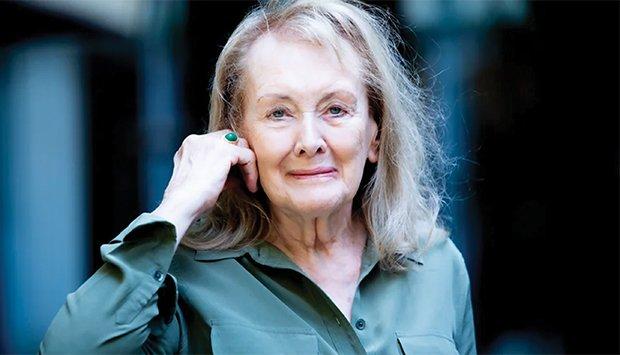Africa-Press – Botswana. The 82-year-old French novelist Annie Ernaux was awarded the 2022 Nobel Prize for Literature, “for the courage and clinical acuity with which she uncovers the roots, estrangement and collective constraints of personal memory”, announced the Swedish Academy, at the end of the yesterday morning in Stockholm.
Ernaux is the 17th woman to receive the Nobel Prize for Literature. Reacting to the award, the author told Swedish television channel SVT that she considered the award “a great honor” and “a great responsibility”.
At the time of the announcement, the Academy said that it had not yet been able to get in touch with the writer, but that it hoped to be able to do so soon. “I was working in the morning and the phone was ringing all the time, but I didn’t answer it,” Annie Ernaux told the Swedish news agency TT.
According to the Associated Press, Ernaux was taken by surprise, having learned about the assignment after answering a call from a Swedish journalist. “Are you sure?”, asked the writer.
The author of more than 30 literary works, Ernaux was born in 1940. He grew up in a small village in the Normandy region of northern France, where his parents had a café and a grocery store. His path to a literary career “was long and difficult”, pointed out the Swedish Academy. In his work, which is mainly inspired by his own life, Ernaux “examines, consistently and from different angles, a life marked by strong disparities in relation to gender, language and class”. Writing is, for the author, a political act, which serves to open the eyes of readers to “social inequality”.
“Annie Ernaux clearly believes in liberating the force of writing. Her work is uncompromising and written in simple, polished language. And when, with great courage and clinical acuity, she reveals the agony of the class experience, describing shame, humiliation, envy or inability to see who we are, has achieved something admirable and lasting”, said the chairman of the Nobel Committee, Anders Olsson, quoted by the Observer.
Asked if the Swedish Academy intended to send some kind of message with the choice of an author who addresses social issues in her works, Olsson, who was responsible for presenting the laureate and answering questions from journalists present in Stockholm, stated that the Committee focuses on “literature and literary quality.” “We don’t have any message for the world,” he said.
“But we think it’s important that the laureate’s work has a universal consequence, that it reaches everyone and, in that respect, I think the message is that this is literature for everyone,” he added.
On the fact that the award was not awarded to a non-European writer, Olsson explained that the jury follows different criteria and that it is not possible to satisfy them all. “We can only make sure that what we’re looking for is literary quality,” he said, in response to a question posed by the Associated Press journalist.
“Last year we gave the prize to a non-European writer, Abdulrazak Gurnah, this year we gave the prize to a woman. There have been few (female) laureates in the past, as we know. We have tried to broaden the spectrum of the Nobel Prize, but the our focus should be on literary quality.”
Annie Ernaux is only the 17th writer to be awarded the Nobel Prize for Literature. The last woman to receive the prize was the American poet Louise Glück, in 2020. In recent years, the Committee has sought to include more women, who were rarely awarded, awarding the Nobel Prize in Literature to a woman every two years since 2013, when the Canadian Alice Munro was awarded.
Direct writing without artifices or modesty
An “absolutely fair” distinction and a “well-deserved recognition” for “very original and open-hearted writing”. , faces the awarding of the Nobel Prize for Literature to the 82-year-old French author.
For the publisher, who was speaking in statements to Observador and Rádio Observador, Ernaux “is an author who manages to take the most intimate stories of her own history to create narratives with universality, by talking about themes that are very human and that, therefore, , speak of all of us”.
“It is undoubtedly original writing. This ability that Annie Ernaux has to take the smallest events in life, the specificity of each moment in her history, and look for these reflections in what they tell about the country and the moment and world in which Vive is really very original”, pointed out the editor.
São José Sousa also recalled that “auto-fiction”, a literary genre that mixes fiction with personal and biographical accounts, “has been a lot of work in recent years”, but if “there are some authors that stand out in this field, Annie is undoubtedly a master at making this bridge. And it is very curious that she does it with a writing that is so bare, so direct, sometimes even a little raw, without artifice and without modesty, without the need to embellish anything, because life as it is and with the simplicity with which it can be reported ends up gaining more strength”.
Regarding the impact of the award of the Nobel on the publication of books by Annie Ernaux in Portugal (translated into Portuguese), the publisher of Livros do Brasil said it could not “specify” whether there are already works planned to be edited or re-edited, among the vast production literary work by the author that is only partially available in Portuguese translation. But “the will is for this to happen”.
“Annie Ernaux is an author who has several works published and only part of them were published in Portugal, it’s true. We noticed that not being exactly a bestselling author, she was an author with a loyal audience. Now it will certainly be the opportunity for more readers And we do want to make more titles available by the author”, added São José Sousa.
A year ago, the Nobel had been awarded to novelist and short story writer Abdulrazak Gurnah. Born in Tanzania, but residing in the UK since the 1960s, the writer was awarded “for his ability to delve uncompromisingly but also compassionately into the effects of colonialism and the fates of refugees who are in an abyss, divided between cultures and continents.” , justified the Swedish Academy at the time. The organization also highlighted Gurnah’s “dedication to the truth” and his “aversion to simplifications”.
The Nobel Prize was established in 1901. The winner of the literary award receives a monetary prize of approximately 985 thousand euros and is chosen, in accordance with Alfred Nobel’s wishes, through “the production in the field of literature of the most exceptional work” with a “ideal direction”.
Profile of the distinguished
Registered under the name of Annie Duchesne, Annie Ernaux is, in addition to being a writer, a teacher. Her literary work, mainly autobiographical, novel and memoir, refers to sociology.
Born on September 1, 1940, in Lillebonne, France, he graduated from the University of Rouen Normandy Mont-Saint aignan Campus.
Among his works, “Cleaned Out”, “A Man’s Place” and “The Years” stand out.
For More News And Analysis About Botswana Follow Africa-Press






